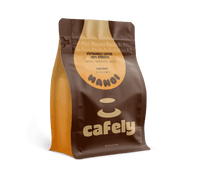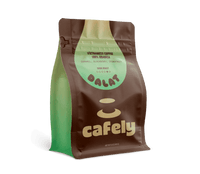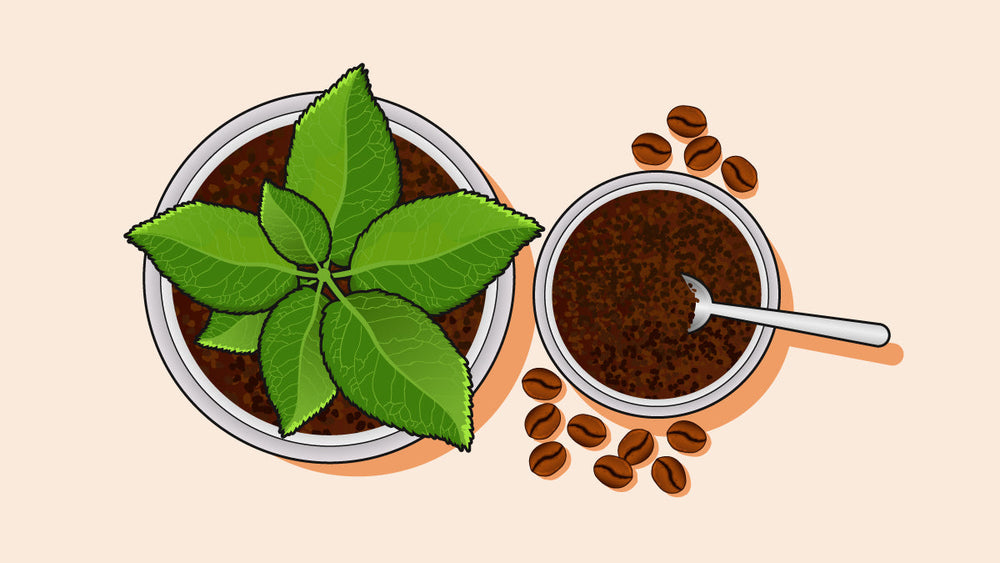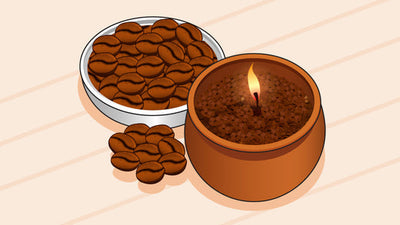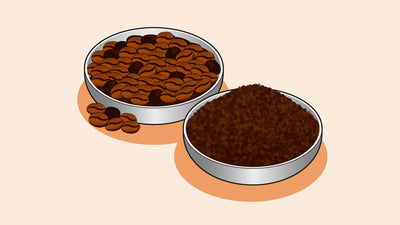Before you dump the used coffee grounds into the trash, take a moment to look outside. Some of your plants also enjoy coffee, although not quite the same way we do.
We’ll walk you through the details of which plants are coffee’s biggest fans and which ones should stay away from it. We’ll also explain how coffee can become the garden hero, including how to use it to boost soil health and deter pests.
Why Do Some Plants Like Coffee Grounds?
While we know a cup of coffee is packed with nutrients and antioxidants, the used grounds also retain some of that goodness. Plants need nutrients like potassium, magnesium, calcium, and, most importantly, nitrogen to help them grow — all things you can find in your used coffee grounds.
The used coffee grounds also create a great barrier so that plants can retain water, and provide structure when used in pots, planters, and beds.
Related: 105 Coffee Facts: History, Health, & Trivia
Plants That Benefit From Used Coffee Grounds:

Some plants don't like coffee grounds, but many of them love it in their soil. Use coffee grounds for plants that thrive in slightly acidic soil as they lower the overall pH.
We've put together a list of indoor and outdoor plants and produce that enjoy a bit of coffee (almost) as much as we do.
Garden Plants That Like Coffee Grounds
- Rhododendrons
- Roses
- Hydrangeas
- Azaleas
- Gardenias
- Camellias
- Nasturtiums
Fruits & Vegetables That Like Coffee Grounds
- Blueberries
- Peppers
- Cucumbers
- Eggplants
- Carrots
- Potatoes
- Parsley
- Radishes
- Strawberries
- Mango trees
- Pineapples
- Citrus trees
- Avocado trees
House Plants That Like Coffee Grounds
- Peace lilies
- Christmas cacti
- Snake plants
- Money trees
- Succulents
- African daisies
How to Use Coffee Grounds in Gardening
Although there is nothing stopping you from sprinkling coffee grounds on top of your soil, there are far ways to add them to your plants that also protect them against things like fungal growth.
For more details, check out our article on how to use old coffee grounds.
Create Compost
A compost bin is a great asset for any gardener, but you may not have thought to put your coffee grounds in it. Alongside kitchen scraps like vegetable peelings and eggshells, you can add your used coffee grounds, too. If you use paper filters for drip coffee or pour-over, you can add these as well.
This integrates the coffee grounds with other compounds, further enhancing the nutritional quality, but keeps the grounds from being placed directly into the soil, which could be too much for some plants — especially young ones.
As a general rule of thumb, aim for your compost to be 25-30% coffee grounds at the very most. This limits the amount of caffeine concentration in the compost, which could do more harm than good.
Brew Liquid Fertilizer
Making liquid fertilizer with your coffee grounds is a great way to give your plants a pick-me-up, especially in the summer months or for indoor plants that you don't want to add compost to.
Use a ratio of 3 parts cold water to 1 part coffee grounds, and combine them in a bucket or similar vessel. Leave for a few hours or overnight until the water looks more like a very weak tea.
Once it’s ready, you can pour it onto the soil around once a week for your plants to get the most benefits. But just like us, they can suffer from adverse effects if they have too much coffee.
Make Some Mulch
Coffee grounds make an excellent, nitrogen-rich mulch for gardens. To turn them into mulch, simply collect the used grounds after brewing coffee. Allow them to dry fully by spreading them out on a baking sheet or tray. This helps the grounds to separate to avoid compaction and also gets rid of any moisture that may introduce mold.
Once they’ve dried, you can apply the grounds as a mulch layer for plants like those listed above. But, for the best general results, mix the coffee grounds with other mulch materials like grass clippings, dead leaves, and a bit of compost for a nutrient-packed mulch that keeps away weeds and helps your plants retain moisture.
Ward Away Weeds
Coffee grounds are a perfect deterrent for pesky weeds. Although we don't recommend using it in beds with your plants and flowers, it works perfectly when spread in the cracks of pavement or at the side of walls where unwanted weeds have made their appearance.
Coffee has allelopathic qualities, meaning that it stunts seed germination and growth, as well as a strong caffeine concentration that’s harmful.
Benefits of Coffee Grounds for Plants

Let’s go over the details of why coffee grounds are so good for some plants.
1. Full of Nutrients
Coffee grounds are a great source of nitrogen, containing around 1-2% of the stuff by volume. Plants need nitrogen to perform vital functions, as it is a key component in their chlorophyll, which they use in photosynthesis.
It’s not just nitrogen that’s beneficial to your plants. Coffee grounds are also packed with other minerals and micronutrients like phosphorus, magnesium, iron, and calcium.
2. Protection from Disease
When coffee grounds break down during the composting process, they are targeted by certain types of fungi: Pseudomonas, Fusarium, and Trichoderma. These fungi actually make coffee grounds more suitable for plants. They also protect the plants from rots and wilts that can affect potatoes, peppers, eggplants, and herbaceous succulents.
3. Increase Water Retention
Coffee grounds can also increase the water retention of your soil, which is especially key when growing plants that need moist soil to thrive. This is because they create compact humic substances, in layman’s terms, the organic components of the soil. The tight nature of these humic substances helps to keep water in rather than looser soil, which can let water seep through too easily.
4. Lowers pH of the Soil
As you might already know from some of our other articles that look at the chemical composition of coffee beans in more detail, coffee contains acids that help to lower the pH of the soil. Although this effect is not much — normally to a pH of 6-6.5 — this can make all the difference to plants that prefer acidic soil, such as azaleas and citrus trees.
5. Reduce Waste
Another great benefit of coffee grounds is that when you reuse them in your garden, you're not just helping the plants in your backyard but the wider environment, too! Throwing them out adds more to the landfills and leaves a carbon footprint. Reusing coffee beans avoids that and gives them a new lease on life that plants will love.
Read More: The Difference Between Robusta and Arabica
Potential Drawbacks & How to Avoid Them

Of course, much like people, there are some plants that simply don’t like coffee and it can be detrimental to their health.
1. Not Good for Alkaline Plants
Plants that prefer soil that is on the alkaline side — like lavender, clematis, and lilac — won’t be happy if you add coffee grounds to their beds as it will decrease the pH too much and lead to stunted growth and potentially dieback.
2. Too Much Moisture
Although we enjoy a fresh cuppa, your garden definitely won’t. Fresh coffee grounds rather than used ones can introduce too much caffeine to the soil and compact it too much, leading to far too much moisture retention and the chance for damaging fungal growth of the roots.
3. Impair Plant Growth
Coffee that is high in caffeine, like robusta coffee, may also not be suitable for your garden for the same reasons. Plants that absorb caffeine see stunted root development, impairing their growth.
To avoid harming your plants instead of helping them, remember to always use dried, used coffee grounds or compost them with other materials to create a less harsh, nutrient-rich blend they’ll love.
FAQs: What Plants Like Coffee Grounds?
Still want to know more about how plants get their caffeine fix? We’ve got you covered below.
1. Can I use coffee grounds on all my garden plants?
Sadly, not all of your plants are going to enjoy your coffee leftovers. This especially goes for plants that enjoy alkaline conditions in their soil, like asparagus, lavender, and thyme.
2. How often should I add coffee grounds to my garden?
Your plants will require a lessened coffee habit than perhaps you do. With coffee ground fertilizer, a small amount once a week is beneficial, but for larger quantities, try to do so sparingly, such as once a month.
3. Are coffee grounds safe for indoor plants?
Yes, but use them sparingly. To avoid mold growth, make sure to only use dried used coffee grounds, or consider using the coffee ground fertilizer recipe we covered as part of their watering regimen.
4. Can coffee grounds replace regular fertilizer?
Much like you, your plants need a balanced diet to stay healthy, and they can’t get this from coffee grounds alone. Although they can be a useful addition to some plant varieties, you should always include other compost materials and fertilizers as required.
5. What is the best way to store coffee grounds for garden use?
Dry them out to prevent mold, and store them in a cool, dry place until ready to use. So long as the container is airtight, it can easily go in your garden shed or be stored in your garage for easy access.
6. Do coffee grounds deter pests?
Some people swear by the fact that slugs and snails are repelled by coffee grounds, but some of the research out there says otherwise. There is no harm in trying it though if you have particularly tricky customers in your garden. One creature that coffee grounds do repel is cats. They hate the smell, and it can stop them from doing their business in your garden!
Additionally, burning coffee grounds helps to repel bugs like mosquitoes and flies due to the strong, smoky aroma it releases. It's a natural trick some gardeners and campers use to help keep insects at bay.
7. How do coffee grounds affect soil pH?
Coffee grounds can slightly lower the pH of your soil, making it more acidic. This is perfect for plants like azaleas, potatoes, and peppers.
8. Can decomposed coffee grounds harm my plants?
When properly composted, they are safe and beneficial for most plants. However, the concentration of coffee grounds in your compost shouldn’t be more than 30% at most.
9. What should I avoid when using coffee grounds in my garden?
Avoid using fresh, uncomposted grounds directly on sensitive plants to prevent fungal growth. Always try to mix the coffee grounds with other organic materials to help dampen down the concentration and give your plants the extra nutrition that they need, as too much of it can be harmful due to the caffeine content.





